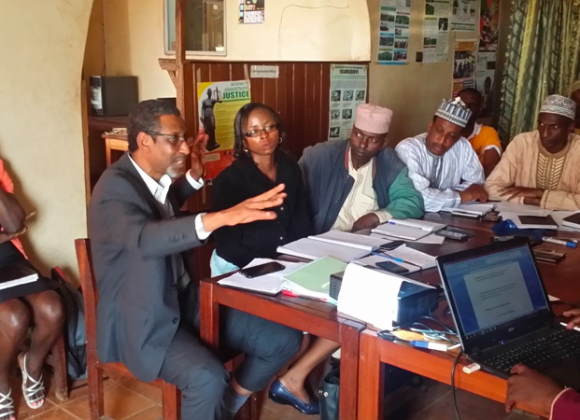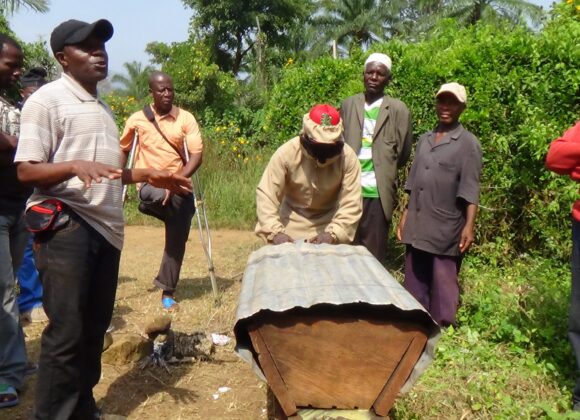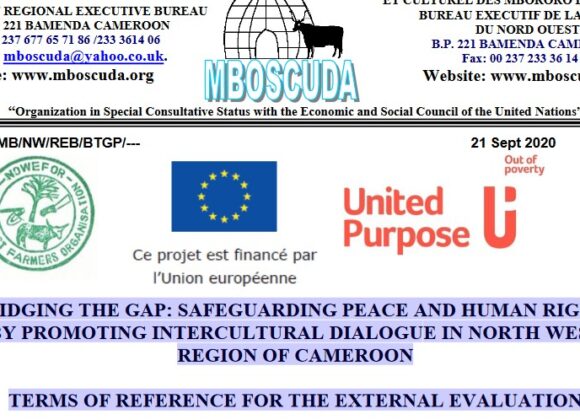Motto {Baldul}: Jangen, Demen e Duren (education, environmentally sustainable agriculture and cattle herding).

Contradictions
This geographical factor was a crucial problem. It made any attempt at answering the question “What kind of development?” almost impossible. In an attempt to find an answer, it was agreed that it will not surface to try to make very clear definitions of what the group called “la Question Mbororo” alone and drawing up strategic solutions. If there was anything to be done and if it were to work, then it will need all the available human and material resources that the community could produce. And if the initiative was to get anywhere further than mere words and paperwork, it had to involve the grassroots in all parts of the country.
This group in consultation with the promoters of the other groups, therefore, decided to sponsor and host a large meeting in Yaounde to discuss these issues. This meeting was to involve members of all three groups and any other person who might be interested in the formation of a Mbororo Organisation. They, accordingly issued what they regarded as a clarion call “A tous les Mbororo du Cameroun” (App. III). They were fully aware of the risks involved and the likely repercussions in the event of failure and their worries were not unjustified.
A fussy and vague distrust existed among the different actors with each group showing a tenacious hold to its ideas and methods. Matters were further complicated by the mutual (but yet undefined and un-dispelled suspicion of each other or of the various clan lineages (lenye) that still today reign supreme within the Mbororo community. A feeling of general fear and uncertainty shrouded the whole venture. The meeting was finally scheduled for May 1992 in Yaounde after two postponements and hesitation from some people. The precarious political situation at the time was not conducive for any innovative initiative especially from an underprivileged and despised people like the Mbororo!
Right from the beginning it was evident that forming a Mbororo Organisation though a lofty idea, and for all its raison d’être has its own inherent problems and contradictions. Addressing the question of Mbororo development meant confronting a two-fold and complex problem:
- It means changing a lifestyle without destroying the underlying culture and customs of the people that have helped to sustain it for centuries. What do we preserve of our past and what do we change of it to adapt to our constantly changing environment?
- It also means challenging the nature and balance of power relationships that have helped to marginalized and sidelined the Mbororo people without confronting these same repressive and retrogressive forces, which still today, strive to maintain the status quo.
On the one hand, the problems facing the Mbororo community are many and complex. The Mbororo community lacks the tradition of communal organisation. It also has few literate/educated people, who could work for an organisation and no one member of the already formed groups had any training in group or NGO management. On the other hand, as always happens around the world underprivileged and indigenous peoples often fall prey to the exploitation of “dominant society”. Any initiative by the latter, therefore, that sought their right to self-determination and that invariably affects the interests of influential and powerful patrons of society, is likely to meet with repression. And this is exactly the case with the Mbororo people and MBOSCUDA today with the likes of Baba Ahmadou Danpullo of Ndawara ELBA Ranch (App VI).
Join Us
Welcome to MBOSCUDA
Welcome to the Community. We have been existing since 1992.

Latest News

Make A Call
Our Location
MBOSCUDA National Executive Bureau B.P 1086, Yaoundé-Cameroon
MBOSCUDA Building, Old Town,
P.O Box 221, NWR, Bamenda – Cameroon



